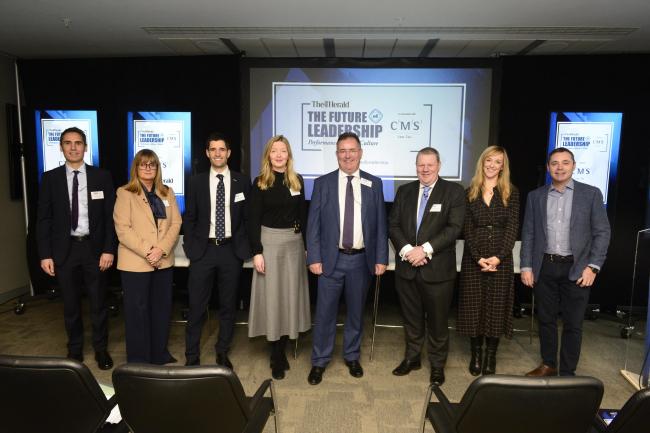All of this – and more – took centre stage yesterday at the latest event in The Herald’s Business Breakfast series in Glasgow. “The Future of Leadership” event saw a high-profile panel of respected business leaders engage in lively debate about leadership in business.
One of the key observations from the panel at the event, held at the Glasgow offices of headline sponsor CMS, the international law firm, centred around profit not being the main motivation. Instead, the speakers highlighted the importance of taking people on that journey with you.
Nicola Pidgeon, assistant director at EY, spoke about the current “world of disruption and information overload” which meant that managers had to be “absolutely clear” about what they expected from their teams. “Understanding and clarity are crucial,” she said. “There are different kinds of leadership – you can be authentic, charismatic – but you must always be clear.”
There was a need, Ms Pidgeon suggested, to “move away from the Monday to Friday, pointing out that it wasn’t unusual for people who had left the company to come back. “We call the ‘boomerangers” – they leave us but with good experiences so they want to come back.”
Edrington’s managing director of group operations, Graham Hutcheon, agreed, adding that “adaptability is very important”. He said: “You acquire skills over time but to be a leader you have to be visible in your business and ensure that people see you practising the values that you encourage them to adopt.”
Jonathan Golby, chief executive of Peak Scientific, a manufacturer of laboratory gas generators, spoke about the importance of having a “strong belief culture” within your organisation while Dr Lesley Sawers OBE, the much-respected business figure who is now director of GenAnalytics, a market insights, communications, and research consultancy, cited respect for your colleagues as a key attribute for any leader.
Mr Golby also discussed the challenges involved in motivating 500-plus employees in locations across the globe, from the UK to Sao Paulo in Brazil to Tokyo in Japan. “How do you empower teams when they’re in other parts of the world,” he was asked by event chairman Gordon Stevenson, digital transformation director at Newsquest Scotland.
“Having strong culture and belief systems underpins everything we do,” he said. “You have to trust your managers to make the right decisions.”
For Graham Hutcheon, managing director of group operations at global drinks firm Edrington, laying down clear company values and aspirations was crucial. Edrington, one of Scotland’s largest private companies and owner of several well-known whisky brands, donates money to good causes via the Robertson Trust.
“It is the vision of the company to donate more and it is interesting that younger employees – millennials – come to work for us and are not necessarily driven by money; they want to work for a company that has our values,” he continued.
“Giving is the number one thing in our business,” said Mr Hutcheon. “Integrity comes in at number two. When I go onto the production floor in the Dominican Republic or one of our distilleries here in Scotland, the values have to be the same – we all live and breathe what the business says it is.”
Gillian MacLellan, partner in the CMS employment team, struck a chord with the audience with her comments on the importance of communication within a business. “Communication is the key kernel of leadership,” she said. “And it has to come from the top.
“Communication has to be authentic, genuine and frank, and you have to communicate through the good times and the bad times.” Leaders, she said, had to listen to all views. “If you bring people into your organisation, be prepared to listen to what they have to say – and act upon that if needs be.
“Good leadership means that people have to walk the walk and talk the talk – and you have to treat people well and with respect.”
Lesley Sawers added food for thought when she threw governance such as climate change and diversity into the mix. The human rights of employees, she said, also had to be taken into consideration.
Meanwhile, Jack Letson, partner in the CMS corporate team, reminded the audience that the world was a “much smaller place” thanks to the internet and said that his advice to business leaders would always be to “have fun” amid the serious day-to-day business.
Alan Nelson, office managing partner at event sponsor CMS, commented: “We are again delighted to have hosted another successful business breakfast in partnership with The Herald.
“The focus of our breakfast was on leadership and the importance of getting the right formula for culture and governance to enable organisations to achieve their long terms strategies.
“This is such a key focus for all organisations and bringing together such a diverse panel to share their journeys in this area has been really thought-provoking and I am sure valuable for all the attendees who have common goals to ensure the correct leadership is making a positive impact on their organisations.
“We are extremely appreciative to our keynote speaker, Alasdair Gardner, who provided a really interesting insight into this area and also to our panel members who shared their experiences.”
Mr Nelson also alluded to the speakers who highlighted the importance of values and being a purpose-led organisation. “This should percolate through your organisation,” he said. “While it is important for companies to be profitable, you need to put your people right at the centre of what you do.
“Good leaders in business will always take a long-term view.”
For further details,please visit https://newsquestscotlandevents.com/events/future-of-leadership/

